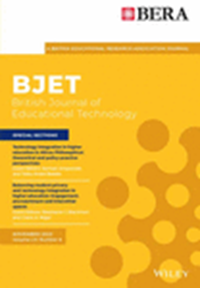Incorporation of peer-feedback into the pedagogical use of spherical video-based virtual reality in writing education
Abstract
Writing is a fundamental skill linked closely with academic achievement, day-to-day communication, formal negotiations, and more. However, due to their lack of contextual experience, learning to write has been a demanding and complex cognitive process for most learners. As a result, learners struggle to exhibit positive learning behaviours and cognitive engagement in writing, let alone embrace deep and autonomous learning. To solve these problems, in the present study, a spherical video-based virtual reality (SVVR) learning environment is developed to provide students with a contextual learning experience. Moreover, a peer feedback strategy is used to guide students in deep learning in writing. A quasi-experimental study was conducted to verify the effectiveness of the proposed approach. A total of 79 students from one primary school in southeast China were recruited. The students were assigned to either the experimental group (EG) exposed to the peer-feedback-based SVVR (PF-SVVR) approach or the control group (CG) exposed to the conventional SVVR (C-SVVR) approach. The results show that PF-SVVR had more positive effects than C-SVVR in terms of students' writing performance, cognitive engagement and autonomous learning tendency. In addition, the PF-SVVR approach was found to be more beneficial for triggering deep learning in writing than the C-SVVR approach. This study further found that students in the PF-SVVR group tended to exhibit less disorderly behaviours than those in the C-SVVR group. Our study contributes to the prior literature by exploring the educational potential of the PF approach in the context of SVVR-enabled writing learning.
Practitioner notes
What is already known about this topic
- Peer feedback approach provides opportunities for writing learners to regulate their longer-term cognitive and behavioural competencies.
- Spherical video-based virtual reality (SVVR) not only provides an authentic experiential learning context for learners, but it also significantly reduces the cost and the need for the high-tech capabilities of traditional VR.
What this paper adds
- A peer feedback-based SVVR approach is proposed to promote students in learning to write.
- It was found that students' quality of learning to write can be improved by applying the PF-SVVR approach in writing courses.
Implications for practice and/or policy
- It is worth promoting the application of the peer feedback strategy and SVVR in school settings.
- The PF-SVVR approach is useful for promoting young writing learners' cognitive engagement, autonomous learning tendency and deep learning.
- Further investigations on the effects of employing the PF-SVVR approach in writing, with anonymous strategies in the process of giving or receiving peer feedback, are expected.

 求助内容:
求助内容: 应助结果提醒方式:
应助结果提醒方式:


